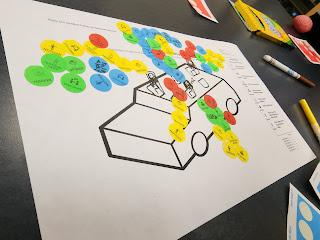Brains On Research Study
Our family listens to the Brains On Podcast fairly regularly when we are in the car, particularly on long drives. If you are not familiar with this, it's a science podcast that incorporates fun and learning about new or unusual questions, mystery sounds, fun facts, guest scientists. Episode examples are "Where Does Our Imagination Come From?", "Why is Glass See Through?", "Where Does Language Come From" and so much more.
We stumbled on this a few years ago looking for something that our whole family could listen to, no matter the age. Something not too childish that the adults would get sick of, something the kids can engage in and learn instead of being on screens in the car. We enjoy listening to this and are pretty regular listeners. It's based out of Minnesota (partnered with MPR), but the listenership is worldwide.
Fast forward to a few months ago - they were recruiting research participants that listen to the podcast in Minneapolis and Los Angeles - I applied and we were selected! This research project is a collaboration between Brains On and the Science Museum of Minnesota.
About a week and a half ago, Brains On came out to New Prague to meet with us (myself, Quinn, Cora and Marisa - Scott was out of town). They hooked us up to microphones and loaded cameras into my car. They had questions for us before having us drive around while listening to a podcast and recording everything we said and did. They told us to act as normal as possible and pretend there were no cameras. For the most part, I think we did pretty good - I don't think you can 100% be normal hooked up to mics and cameras staring at you. Cora was more shy and quiet than normal. They had us drive around listening to a "fake" segment for about 5 minutes to relax us with cameras and mics before the episode for the study came on.
They told us to completely do exactly what we were doing if we were listening regularly. If we turn the volume down, if we talk, if we get sidetracked - just do what you always do.
We listened to a podcast called "Why are We So Sweaty?" which was made just for the study.
After the drive, they had questions about how normal we were acting, what was usual, what was different in our behavior, things that stood out to us about the drive. For example, we noted Cora was much quieter than normal compared to our usual listening experience.
There was a part where the podcast started talking about tongue twisters, so we got sidetracked on a conversation about that. Marisa shared some German tongue twisters - and noted that she felt the entire German language was a tongue twister.
1. Fischers Fritze fischt frische Fische (The Fisher's son Fritz is fishing for fresh fish)
2. Blaukraut bleibt Blaukraut und Brautkleid bleibt Brautkled (Red cabbage remains red cabbage and a wedding dress remains a wedding dress)
The research is two-phases, so we had our second part this week to meet again for a post-interview. This time she showed us specific video clips of us driving in the car and listening, and then had questions related to what we were doing or asking us if those are things we normally did when listening.
My understanding of the research is how to make their podcast better, useful in the car, better understanding of how real families use it and interact with it and make it more engaging. They want a better understanding of how it's engaged with "in the field". She had a lot of questions about what we did or said on the ride and if we felt that was something we would normally do when we listened to the podcast, or what might be different because of the project.
A few examples:
1. I apparently always ask my kids questions about what we are listening to in order to engage everybody in conversation in an interactive way about what we are learning. The girls were unanimous that I ask SO many questions.
2. There is a "mystery sound" segment that we love and always guess at, so confirming that we normally would be guessing when that comes on rather than just listening. Quinn and I agreed to disagree that we guess most of them right (I think we guess most of them correctly and she thinks we do not - I wish I had camera recorded proof that I am correct).
3. We did not realize our family turns the listening experience into a competition - trying to guess the right answer, showing off what we know or have learned when a given topic is brought up.
After watching the clips and answering questions, she gave us a picture of a simple car, and we had to draw our family in the car - everybody that listens and put them in their usual seat. Each of us were given a set of colored stickers with words on them - we had to self-identify with the words and associate it with our podcast experience (we could also make up words if we felt we needed to). Then we reviewed our word choices and why. We also had to put words to each other to describe our perspective of each others' experience while listening to the podcast and then a group discussion of why we felt that about the other person.
For example, if I am driving and listening, I am a "listener", "teacher", "question asker", but the kids might be a "listener", "reader" or "gamer" if they are also doing something else while listening.
At the end, she gave the kids a brain squishy/stress ball. We also got $100 for our participation.
Anyways - that's as much as I know for now - they will send us our video at some point. This study is closed for participants, and they will spend the next year gathering whatever else they are looking for and anticipate having an episode on it in about a year or so.
Stay tuned...









Comments
Post a Comment